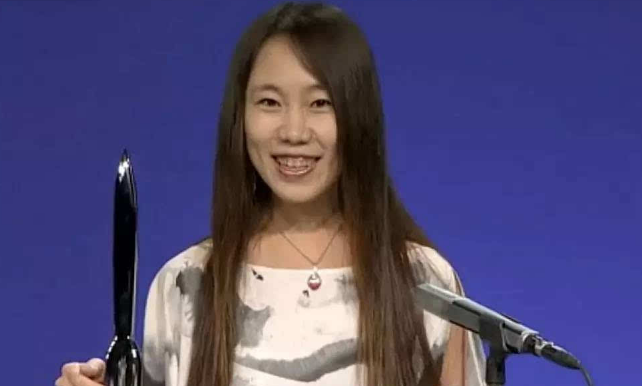Science-fiction author Hao Jingfang became the first Chinese woman to win a Hugo Award, beating best-selling horror and fantasy writer Stephen King in the best novelette category.
日前,科幻作家郝景芳在最佳中短篇小说领域,击败畅销恐怖幻想作家史蒂芬·金,成为首位获得雨果奖的中国女作家。
The 32-year-old from Tianjin received the prize for Folding Beijing, in which she depicts the Chinese capital as a city divided by social class.
这位来自天津的32岁作家,是凭借作品《北京折叠》收获此项大奖的。她在书中将我国首都北京描绘成一个按社会阶级划分的城市。
"My story suggests a possibility for the future and also proposes a solution. I hope the real future will be brighter than my story," Hao said when accepting her award at the Kansas City Convention Center Grand Ballroom.
郝景芳在堪萨斯城会展中心接受颁奖时表示;“我的小说提出了未来的一种可能性,也提出了一种解决方案。我希望真正的未来会比我的小说更光明。”

She said she was not confident about winning and joked that she had been planning to attend the Hugo losers' party. "Sci-fi writers always consider all possibilities," she added.
她表示自己没有信心获奖,并开玩笑称一直计划参加雨果奖失败者聚会。她补充说道:“科幻小说作家总是会考虑所有的可能性。”
Her win comes a year after Liu Cixin won a Hugo for his novel "The Three-Body Problem". Liu was the first Chinese author to win the prize.
这是继一年前刘慈欣凭借小说《三体》获奖之后,中国作家再次摘得雨果奖。刘慈欣是首位获得雨果奖的中国作家。
In Folding Beijing, the city is separated into three areas, and "the residents of First Space see the extra soil as a part of their privilege", Hao said of her story, which was translated by Ken Liu and published last year by Uncanny magazine.
在谈到这部由刘宇昆翻译,由《Uncanny magazine》出版的小说时,郝景芳表示,在《北京折叠》中,这个城市分为三层,居住在第一层的人将多余的土地视作他们特权的一部分。
2015 Hugo winner Liu told China Daily that he thinks Hao's stories convey warmth and a unique color like "golden sunlight".
2015年雨果奖获得者刘慈欣在接受《中国日报》采访时表示,他认为郝景芳的故事传达了温暖,以及如“金色阳光”般独特的色彩。












